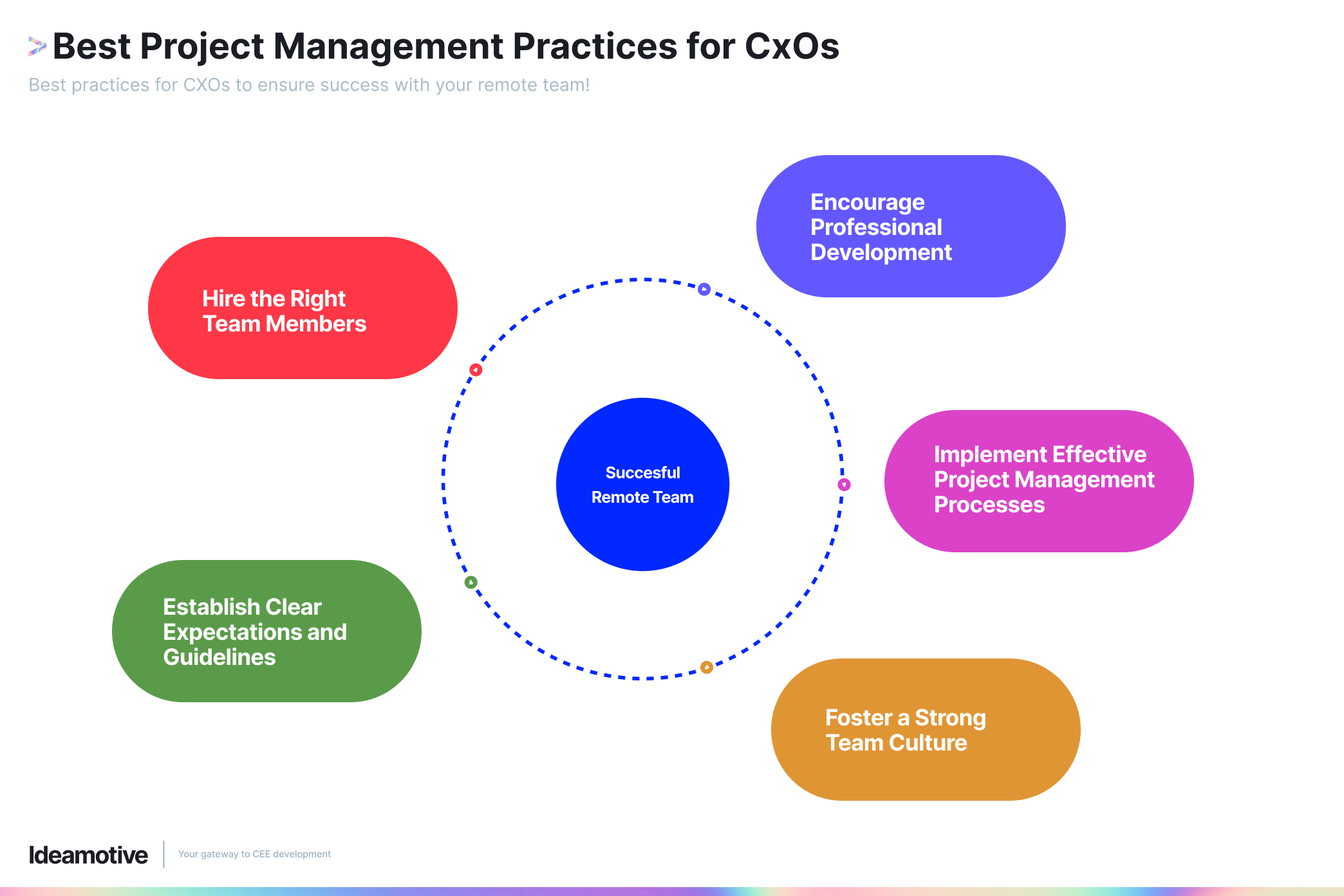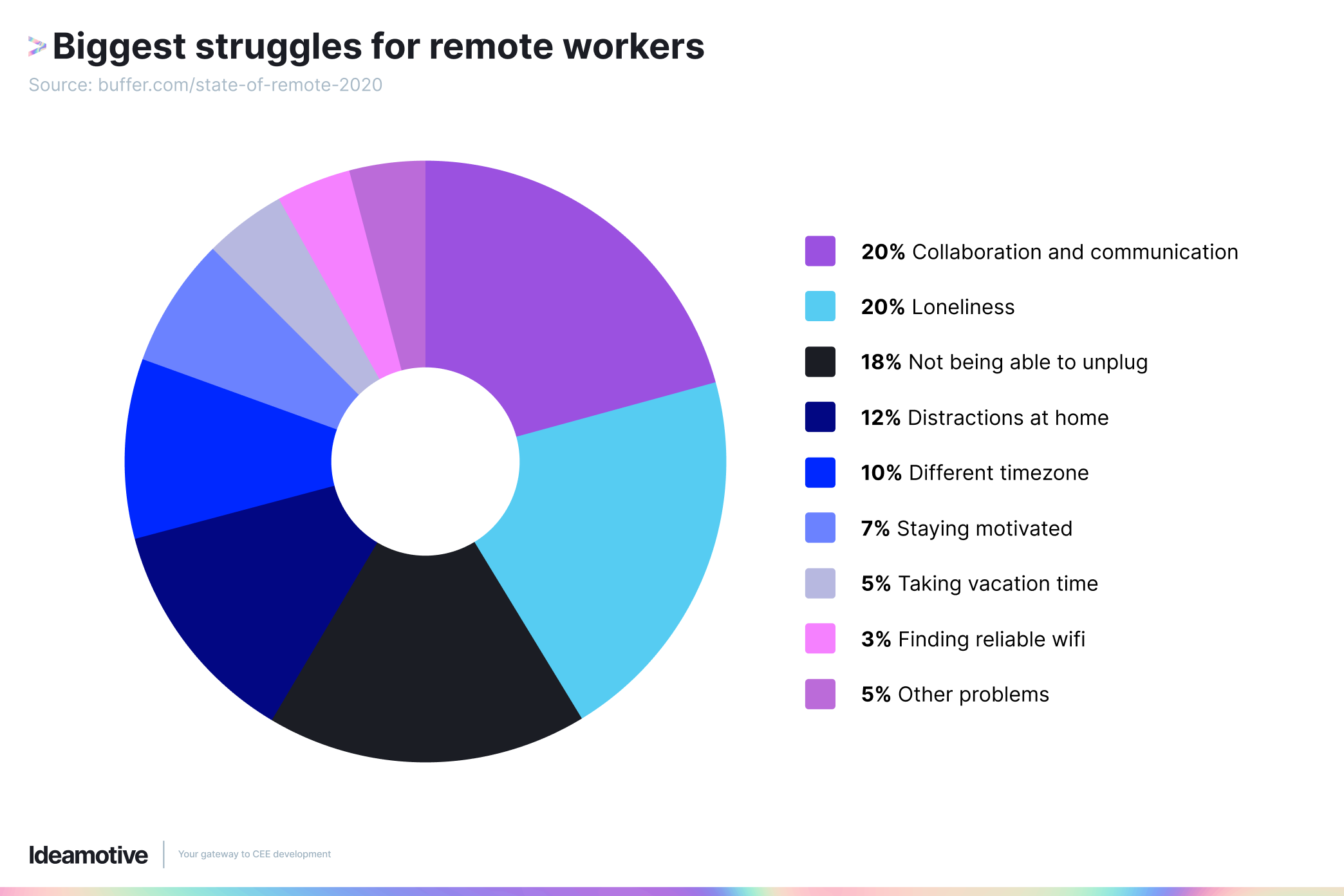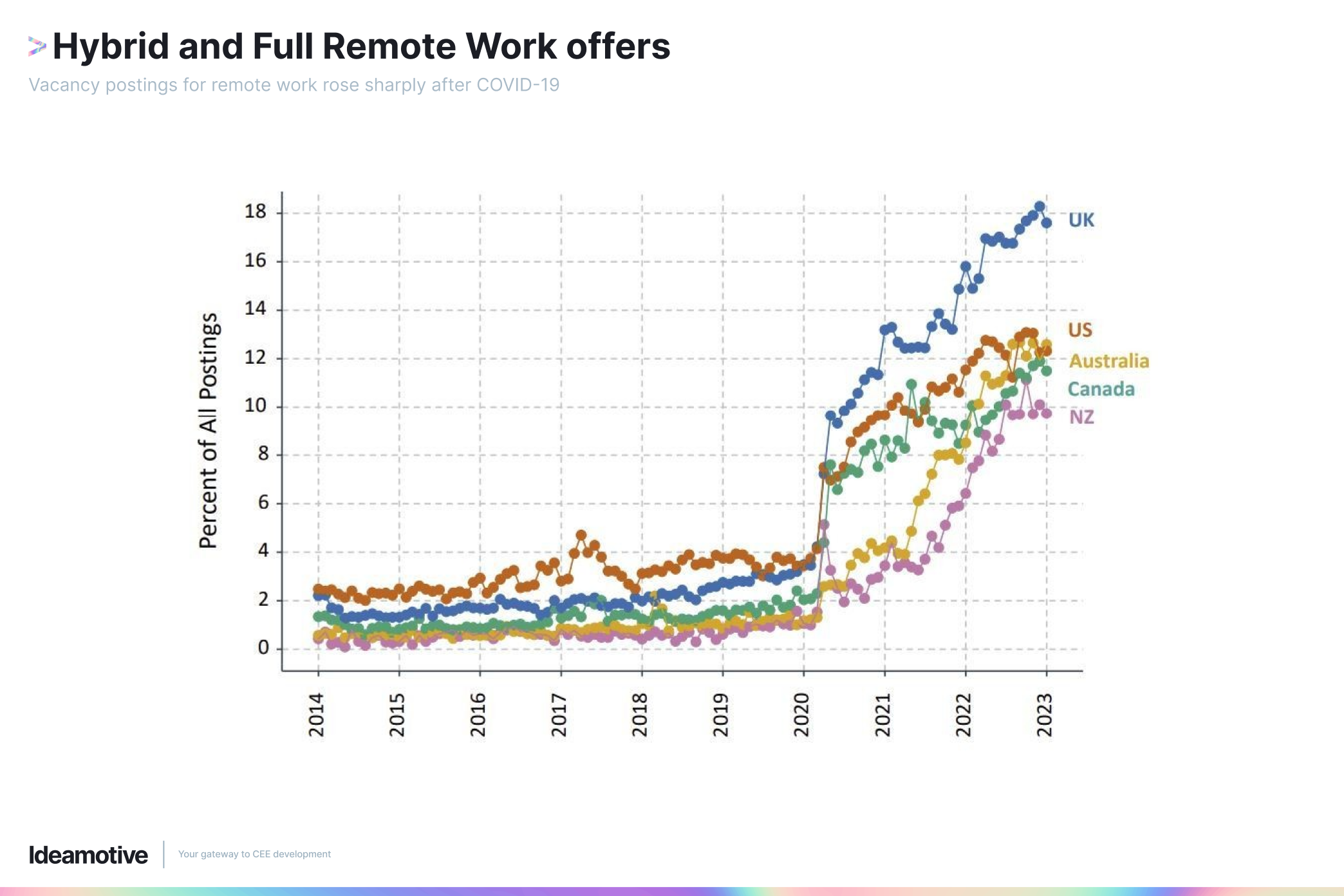Introduction
In recent years, remote work has become increasingly popular in software development. The remote work trend was accelerated by the COVID-19 pandemic, which forced many companies to adopt remote work to ensure business continuity.
Although remote work offers many great benefits, such as increased flexibility and access to a larger talent pool, it poses significant project management challenges for Chief experience officers (CXOs) managing software development teams. Remote teams require a different management approach, focusing on communication, collaboration, respect and trust.
This article will tackle the best practices for CXOs managing remote software development teams, including effective communication, collaboration, and project management strategies. By implementing these practices, CXOs can ensure that their remote teams remain productive, engaged, and successful.
How to set up your remote team for success
When it comes to managing a remote team to achieve the goals and objectives of your organization, as a CXO, you will always be thinking of the best strategies to set your team up for success. The best way to guarantee the success of your remote team is to prioritize communication and collaboration; they are crucial for advancing your remote team.
Also, using the correct tools for managing and developing software can significantly increase team productivity and ensure that everyone on your team is on the same page. One of those tools is communication and collaboration tools. These tools enable team members to communicate effectively, share information, and collaborate seamlessly despite the physical distance.

Identifying the right software development procedures and project management approaches for your team from the ones available such as waterfall, agile, scrum, kanban, DevOps, Lean, Spiral, Extreme programming, Rapid application development, prototype, e.t.c will set your team up for success.
Additionally, developing a project plan that aligns with your team's goals and is well communicated to everyone involved can greatly assist your team in remaining organized and concentrated on completing the project's objectives.
Now, let's look at the best practices you can adopt to support your remote team's success.
Best Project Management Practices for CXOs
The popularity of remote work in software development is rising faster than ever in the current digital era thanks to its many advantages, including improved productivity, greater flexibility, and cost savings. Yet, leading a remote team of software developers can be difficult, particularly for CXOs in charge of the project's success.
CXOs may successfully manage their remote software development teams, boost productivity, and achieve success by adhering to these best practices:
Hire the Right Team Members
When hiring remote developers and software engineers, finding candidates with the required skills and experience to work independently is essential.
Look for candidates with a proven track record of successfully working on remote projects and those with experience working with remote teams. This will help ensure they are comfortable working independently and communicating effectively with their colleagues.
To assess candidates, consider conducting multiple rounds of interviews, including video calls, coding tests, and behavioral interviews. These interviews will help understand the candidate's technical and communication skills and work styles to determine if they would be a great culture fit for your company. Hiring for cultural fit is essential for building a cohesive and productive team.
The onboarding process is critical for setting up your remote employees for success. Creating an onboarding plan with clear goals, expectations, and training is necessary. Here's a guide to help you with hiring remote developers for your team.
Establish Clear Expectations and Guidelines
Establishing clear communication, project management, and collaboration guidelines is essential for managing an agile project management team. You should set clear goals and priorities for your team members, encourage them to establish routines, and prioritize their work to achieve them. Knowing what needs to be done and what's expected of them will help keep your employees' productivity levels high.
Establishing clear communication protocols from the outset is important to ensure everyone is on the same page. One such protocol is figuring out which communication channels to use for different types of messages. For instance, email might be ideal for more formal communication, while instant messaging could be perfect for quick questions or updates. At the same time, video conferencing platforms will be suitable for team meetings or one-on-one meetings with remote employees.
Also, you must establish guidelines for how quickly team members should respond to messages and what to do if they cannot respond promptly. That way, everyone knows what is expected of them and can avoid potential miscommunications.
Another essential aspect is regular check-ins within a remote software development team. These check-ins can take many forms, such as daily catch-up meetings, weekly team meetings, or one-on-one meetings between remote employees and their managers. They provide an opportunity to discuss project progress, resolve issues, and ensure everything runs smoothly.
Foster a Strong Team Culture
Promoting teamwork and collaboration is vital to achieving a solid team culture, which translates into project success when managing software development projects.
To make this happen, you can create cross-functional teams to bring together members from different locations and departments. Making use of project management tools, document-sharing platforms, and communication tools can foster collaboration and ensure everyone is on the same page.

Additionally, trust and accountability are critical factors in a successful team, especially when managing a remote software development team. To build trust and accountability, you need to set clear expectations and goals, provide regular feedback and recognition, and hold team members accountable for their responsibilities.
Collaboration and knowledge sharing are also critical for remote software product development teams. Encouraging team members to share knowledge and best practices, work together on projects, and collaborate on solving complex problems can help foster a culture of teamwork and collaboration, leading to better work outcomes and improved team morale.
Also, offering recognition and feedback for a job well done and acknowledging your team's contributions can help foster togetherness and strengthen the relationship between you and your remote team.
Implement Effective Project Management Processes
For successful software project management, it's crucial to establish clear goals and timelines from the get-go.
It would be best if you worked with team members to define the project plan, identify critical milestones, and establish deadlines for each phase. Consequently, ensuring that everyone is on the same page and working towards the same objectives, which can prevent any potential delays or misunderstandings down the line.

In addition, it's essential to equip the team with project management tools such as Jira, Gantt chart, ClickUp, Kanban board, etc. These tools can help team members collaborate, communicate, and track their progress in real-time, ensuring that everyone is up to speed and that the project is progressing as planned.
Ultimately, assigning tasks and responsibilities is vital for teams to remain organized and efficient in project management methodologies.
You should clearly define each team member's role and responsibilities, assign tasks based on their strengths, and ensure everyone understands their responsibilities. This helps prevent confusion and ensures that each team member works towards a common goal.
Encourage Professional Development
It's important to note that remote software product development teams must continuously learn and grow to remain competitive and deliver high-quality work.
You can provide opportunities for their team members to learn new skills, attend training sessions, and participate in industry conferences and events. Investing in your team's professional development can help keep team members engaged, motivated, and up-to-date with the latest technologies and trends.
In addition to professional development, supporting team members' personal and professional development goals is equally essential, it can be in the form of mentorship, career coaching, and opportunities for company growth. By supporting team members' personal and professional goals, you can build a team of engaged and loyal employees who are invested in your company's success.
How to Handle Challenges Associated With Managing a Remote Software Development Team
Having remote software development teams provides excellent benefits to organizations, such as access to top talent, cost savings, and increased flexibility.
However, managing remote teams also presents challenges and risks that must be addressed to ensure success.
One of the challenges of managing a software development process is creating a sense of camaraderie and social interaction.
To overcome this, motivate your team leaders to organize virtual team-building activities or social events to help team members connect personally. Encouraging team members to share their interests and hobbies outside work can also help build relationships and foster a strong team culture.
Now, let's look at the three critical challenges associated with managing a remote team:
Dealing with Time Zone Differences
One of the most significant challenges of managing a remote software development team is dealing with time zone differences.
Finding mutually convenient times for meetings, collaboration, and communication can be challenging when team members are in different parts of the world. The most effective solution is overlapping working hours when both teams can collaborate in real-time.

If overlapping schedules are not possible, it is essential to simplify communication by agreeing on a few key items. These include reviewing the work completed on the previous day, discussing plans for the current day, and addressing any issues both parties face. It is best to document these points in writing before concluding work for the day to avoid any confusion or misunderstandings.
Having a designated emergency channel is also essential to ensure that any urgent matters can be addressed promptly. This approach can help prevent issues and improve software efficiency, leading to a more successful project outcome.
Managing Cultural Differences
When managing a team from a different cultural background, you must be aware of cultural differences affecting communication and decision-making. Endeavor to promote a culture of diversity and inclusivity, which can help your team members understand and appreciate each other's cultural backgrounds. Also, ensure everyone has the information and resources to communicate effectively and avoid misunderstandings.
Ensuring Data Security and Privacy
Data security and privacy are critical concerns when managing a remote software development team. It would help if you implemented strict security protocols to protect sensitive data, requiring password-protected devices and secure communication channels. Also, ensure your team members regularly audit and monitor their systems to identify vulnerabilities and promptly address issues.
How to Manage Your Remote Team Effectively
It might be challenging to coordinate team members across multiple time zones and ensure everyone is aligned when managing a remote software development team. Effective communication and collaboration are necessary for success in this setting, and real-time tools for software development can help facilitate this process.
To make sure that everyone is working toward the same objectives and that each team member is receiving the feedback and support they require to grow and develop, regular check-ins and performance evaluations are also crucial.
A culture of collaboration and open communication must be fostered, clear communication channels must be established, and realistic goals and deadlines must be defined to adequately manage a remote software development team.
Conclusion
As opposed to conventional in-person teams, managing a remote software development team requires unique skill sets and approaches. Nonetheless, the appropriate strategy can be tremendously effective in producing high-quality work and accomplishing organizational goals.
CXOs should place a high priority on teamwork, communication, and professional growth if they want to succeed. These factors are essential for developing a successful and motivated team, especially for remote teams. It's also critical to arm the team with the resources and management tools required for software development.
Thus, leading a remote team of software developers calls for a proactive and strategic strategy. Yet, with the appropriate approaches, you can build a team that produces excellent work, encourages innovation and growth, and ultimately contributes to your organization's success.













